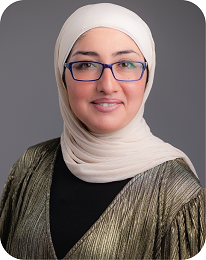Saint Mary’s Structural Heart Program
Our Structural Heart Program specializes in the less invasive options of Transcatheter Aortic Valve Replacement (TAVR) and Transcatheter Mitral Valve Repair (TMVr). And we are currently the only hospital in Nevada to earn Transcatheter Valve Certification from the American College of Cardiology.
Saint Mary’s Interventional and Structural Cardiologist, Dr. Lina Ya’Qoub
Dr. Lina Ya’Qoub is the newest structural and interventional cardiologist to join Saint Mary’s Medical Group Cardiology. She brings years of valuable experience to the Northern Nevada community, specializing in structural heart and coronary disease.
Dr Ya’Qoub is a board certified interventional cardiologist with advanced subspecialty training in structural heart disease interventions. She completed advanced structural fellowship training at the University of California-San Francisco, and interventional cardiology training at Henry Ford Hospital in Michigan. She completed her cardiology fellowship at Louisiana State University, and internal medicine training at the University of Missouri-Kansas City.
Dr. Ya’Qoub is welcoming new patients and is capable of performing all of the procedures detailed below.
| We Treat the Following Conditions | We Offer the Following Procedures |
|
|
TAVR: Transcatheter Aortic Valve Replacement
A Less Invasive Treatment for Severe Aortic Stenosis
Saint Mary’s Regional Medical Center’s Structural Heart Program clinic specializes in the treatment of patients with heart valve disease, and we are proud to offer the less invasive catheter-based option of Transcatheter Aortic Valve Replacement (TAVR) for the treatment of Severe Aortic Stenosis. We plan each TAVR procedure using a team approach to provide patients with patient-focused care, as well as to promote shared decision-making between patients and the team. Our TAVR team includes a multidisciplinary group of physicians and caregivers such as an interventional cardiologist, cardiothoracic surgeons, cardiac anesthesiologists, registered nurses, and a TAVR Nurse Navigator. Our team plans for a comprehensive, individual evaluation of patients with severe aortic stenosis to determine if a TAVR procedure is an appropriate treatment choice.
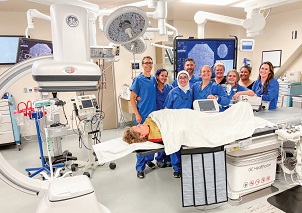
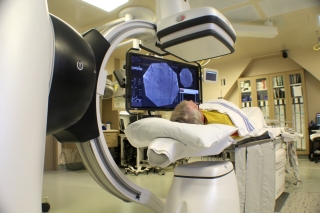
What is Aortic Stenosis?
The aortic valve is one of the four valves in your heart and it specifically regulates the blood flow into the aorta and the rest of your body. The valve is made of thin leaflets of tissue that can become stiff over time. When the leaflets become stiff it makes the opening of the aortic valve narrow and does not allow the valve to fully open and close like it should. As the opening of the aortic valve becomes smaller, your heart must work harder to pump blood through your body, and this can affect your overall health. This condition is called aortic stenosis (AS). It is estimated that aortic stenosis affects 2.5 million people in the United States over age 75, and that it affects men more than women. There are four main causes of aortic stenosis including calcium buildup over time, birth defects, rheumatic fever, or chest radiation. The disease is progressive, which means it will continue to get worse over time. Doctors measure aortic stenosis as mild, moderate, or severe depending on how damaged the aortic valve is when the aortic stenosis is discovered.
What are symptoms of Aortic Stenosis?
When aortic stenosis becomes severe, you may notice symptoms such as shortness of breath, fatigue, chest pain, fainting, or dizziness. Some patients simply report a decrease in activity level or a decrease in the desire to do the things that they once enjoyed because they assume it to be a “normal” part of the aging process. Once patients begin to experience symptoms of aortic stenosis the survival rate is as low as 50% in two years and 20% in five years without aortic valve replacement.
How is the TAVR procedure performed?
An interventional cardiologist, along with a cardiothoracic surgeon perform the TAVR procedure together using a less invasive catheter-based technique. A small incision is made in the right or left groin and through that incision the new heart valve is guided through the femoral artery up to the correct position in the heart with x-ray and transesophageal echocardiography assistance all while the heart is still beating. To learn more about the TAVR procedure please visit https://newheartvalve.com/
What are the benefits of TAVR?
Using a less invasive treatment for treatment of aortic stenosis means most patients can return to their daily activities sooner than with a traditional open-heart surgery. TAVR patients typically experience shorter hospital stays, shorter recovery times, and improved quality of life following the procedure.
Is TAVR right for me?
To see if TAVR is the right option for you please contact the Saint Mary’s Structural Heart office at 775-770-7585. For more information visit https://newheartvalve.com/
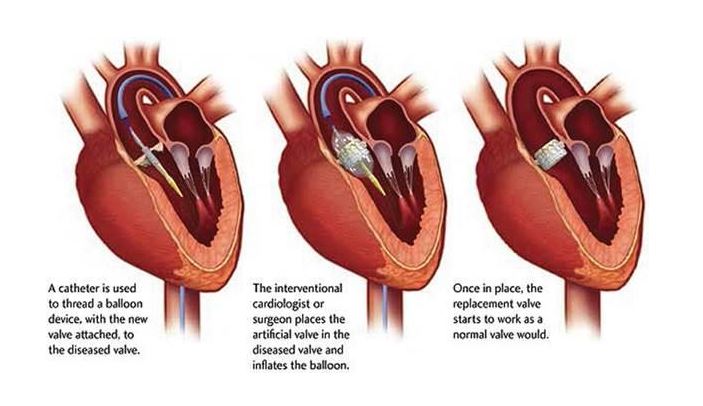
Transcatheter Mitral Valve Repair (TMVr)
A Less Invasive Treatment for Severe Mitral Regurgitation
Saint Mary’s Regional Medical Center’s Structural Heart Program also offers the less invasive option of Transcatheter Mitral Valve Repair (TMVr) for treatment of Significant Mitral Regurgitation using MitraClip™. We plan each TMVr procedure using a team approach to provide patients with patient-focused care, as well as to promote shared decision making between patients and the Structural Heart team. Our TMVr team includes a multidisciplinary group of physicians and care givers such as an interventional cardiologist, a cardiothoracic surgeon, cardiac anesthesiologists, registered nurses, and TMVr Nurse Navigator. Our team plans for a comprehensive, individual evaluation of patients with significant mitral regurgitation to determine if a TMVr procedure is an appropriate treatment choice. For referrals and more information about the Structural Heart Program and TMVr using MitraClip™ at Saint Mary’s Regional Medical Center, please call 775-770-7585.
What is Mitral Regurgitation?
The mitral valve is one of the four valves in your heart and is located between the left atrium and the left ventricle. Mitral Regurgitation (MR) occurs when the leaflets of the valve do not close properly causing some blood to flow backwards into the left atrium. To compensate and keep the blood flowing forward the heart pumps harder, which over time can lead to complications like heart failure. One type of mitral regurgitation is called primary (or degenerative) and it can be related to age, a birth defect, or underlying heart disease. The other type is called secondary (or functional) and it is caused by heart disease that leads to an enlarged left ventricle. Doctors measure mitral regurgitation as mild, moderate, moderate to severe, or severe depending on how much blood is flowing backward when the mitral regurgitation is discovered. It is estimated that about 1 in 10 people age 75 and older have mitral regurgitation.
What are symptoms of Mitral Regurgitation?
With significant mitral regurgitation, you may notice symptoms such as shortness of breath, fatigue, or lower extremity swelling. You can also experience a dry, hacking cough, fainting, or lightheadedness. Left untreated mitral regurgitation may lead to congestive heart failure and eventually death.
How is the TMVr procedure performed?
An interventional cardiologist, along with a cardiothoracic surgeon perform the TMVr procedure together using a less invasive catheter-based technique. A small incision is made in the right groin and through that incision a catheter is guided up through the femoral vein to the correct position in the heart. Using x-ray and transesophageal echocardiography assistance the MitraClip™ is placed on the leaflets of the mitral valve. To learn more about the TMVr procedure please visit www.mitraclip.com.
What are the benefits of TMVr?
Using a less invasive treatment for treatment of mitral regurgitation means most patients can return to their daily activities with minimal downtime. TMVr patients typically experience reduced mitral regurgitation and an improvement in quality of life. Clinical data also shows that those who underwent TMVr with MitraClip™ have a 73% reduction in hospital visits for heart failure in patients with primary MR.
Is TMVr right for me?
To see if TMVr is the right option for you please contact the Saint Mary’s Structural Heart office at 775-770-7585. For more information visit www.mitraclip.com.
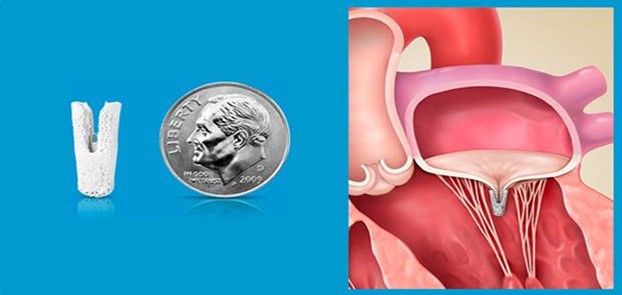
Patent Foramen Ovale (PFO) Closure/Atrial Septal Defect (ASD) Closure
Saint Mary’s Regional Medical Center’s Structural Heart Program also offers treatment of Patent Foramen Ovale (PFO) and Atrial Septal Defects (ASD) with the Amplatzer™ Occluder. We plan each PFO/ASD closure procedure using a comprehensive, individualized team approach to provide patients with patient focused care as well as to promote shared decision making between patients and the Structural Heart team.
What is a Patent Foramen Ovale (PFO) versus an Atrial Septal Defect (ASD)?
PFO and ASD are both technically “holes in the heart” located in the tissue between the left and right atria (the upper chambers). A PFO happens when the foramen ovale fails to close after birth. The foramen ovale is a hole that is found between the upper chambers of the heart in every human fetus that allows blood to bypass the fetal lungs. When a baby is born and takes its first breath, this hole closes and completely seals off in about 75% of the population. For the other 25% the hole remains open and this is known as a patent (open) foramen ovale. While most people with a PFO have no problems, for others problems can occur with the small amount of blood that passes from the right side of the heart to the left side of the heart; this is called a “shunt.”
An atrial septal defect (ASD) is a failure of the septal tissue to form between the upper chambers of the heart, and it is considered a congenital heart defect
What are the symptoms of a PFO or an ASD?
Usually, PFOs are not discovered unless a patient is experiencing symptoms like TIAs or cryptogenic strokes. Cryptogenic stroke is a type of ischemic stroke in which a specific cause cannot be found.
Signs and symptoms of ASDs can include shortness of breath, especially while exercising, fatigue, swelling of the lower extremities, heart palpitations, or stroke.
How is the PFO/ASD closure procedure performed?
An PFO/ASD is closed using a cardiac catheter that is slowly moved into the heart through the large femoral vein in the groin. Angiography is done to get a complete view of the heart and a transesophageal ultrasound (TEE) is used to see the defect better and determine the size of the closure device that will be used.
What are the benefits of a PFO/ASD closure?
Three clinical trials were completed comparing the catheter-based procedure for PFO closure with medical therapy, and analysis of this data suggested that PFO closure decreased the rate of repeated strokes compared to medical therapy.
Is PFO/ASD closure right for me?
To see if a PFO or ASD closure is the right option for you please contact the Saint Mary’s Structural Heart office at 775-770-7585.
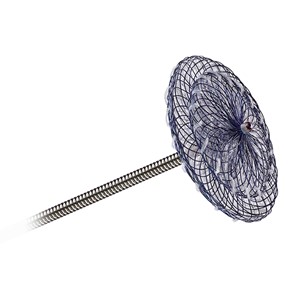
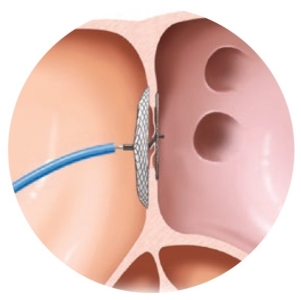
OUR SERVICES
Our all-encompassing health care services ensure you receive the correct diagnosis and treatment for any Cardiac condition.
Aortic Stenosis

Cardiac Rehab

Coronary Artery Disease (CAD)
Heart Arrhythmias

Heart Failure

Pulmonary Arterial Hypertension

Structural Heart Program
Tests And Procedures
Your Health Starts Here
Flexible appointments
We have three locations to serve you.
Same Day Appointments are Available. We also offer 24/7 chronic care management.
St Mary's Cardiology Center for Health
645 N Arlington Ave
Suite 555
Reno, NV 89503
St Mary's Cardiology Northwest
6255 Sharlands Avenue
Reno, NV 89523
St Mary's Cardiology Galena
18653 Wedge Parkway
Reno, NV 89511


